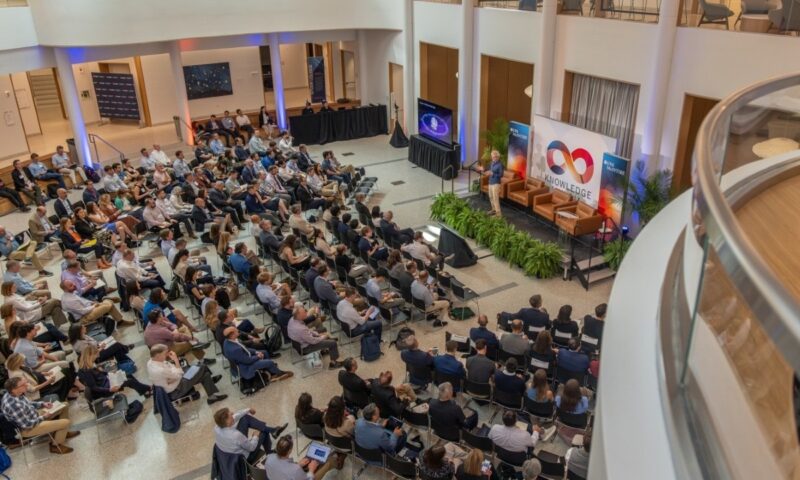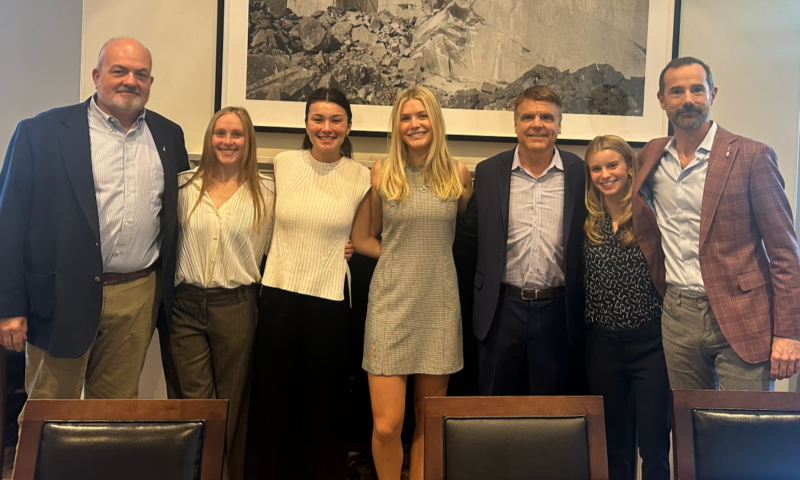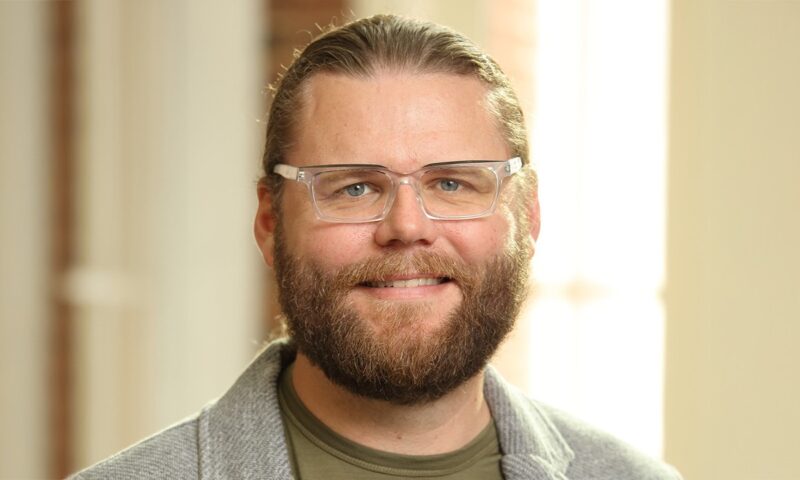In the spring of 2022, Professor Adelaide Wilcox King gave M.S. in Commerce students a great deal to think about. It concerned critically important subjects: the purpose of business and her students’ own understanding of themselves.
King’s concentrated May course, Reimagining Capitalism and the Purpose-Driven Firm, examined multiple global systems and delved into weighty questions for its participants to consider. Through class conversations elevated by the input of expert guest speakers who both supported and challenged many ideas around taking a values-based approach to business, students developed a deeper understanding of the possibilities and constraints of capitalism, while learning about what they themselves value as they embark on their careers.
“We covered a lot of territory in a short period of time,” says King. “That included a framework of organizations as systems, and learning about traditional firms that are shaping and stretching current assumptions about their priorities and capacities to address complex environmental, social, and health problems with creativity and integrity.”
Expert Opinions
Some of those firms and the people who lead and collaborate with them created an impressive list of King’s guest speakers, who provided insights to the course, supplementing its material with personal, firsthand accounts from a wide range of industries.
“Each speaker brought a unique and inspiring story about how their professional experience, capabilities, and personal passions guided them to create innovative and meaningful value in organizations. Each had been successful in traditional careers, and none had landed in their current successful, distinctive positions by following a linear path that they mapped out, or could have anticipated, when they entered the workforce,” she explains. “Their capacities to create distinctive value by working within the systems, and challenging norms of traditional careers and performance outcomes, show how significant value is created personally and organizationally when folks step out into unchartered territory to take on issues that motivate them.”
Highlights from the first few sessions included Stephen MacMillan, President and CEO of women’s health innovator Hologic Inc., discussing transformational leadership; Melissa Thomas-Hunt, Distinguished Professor at Darden and Airbnb’s former Head of Global Diversity and Belonging, discussing stakeholder capitalism; Rick Doblin, Founder and Executive Director of the Multidisciplinary Association for Psychedelic Studies, detailing the future of psychedelic-assisted psychotherapy, and Heather King, Senior Director at Salesforce, discussing the Salesforce Climate Action Plan and its impact on the organization’s systems components and relationships.
In a conversation about building and measuring capacities to generate meaningful outcomes, the class welcomed a range of expert and differing perspectives, including Les Szabo, Director of Constructive Capital of Certified B Corp™ Dr. Bronner’s; Cindy Drucker, PwC Managing Director of ESG Consulting Solutions; Mary Margaret Frank, Senior Associate Dean at Darden, Professor of Business Administration, and Academic Director of the Institute for Business in Society; and Natalie Avalos, Assistant Professor of Native American and Indigenous Studies at the University of Colorado Boulder, who explored ethics, responsibilities, and possibilities in fields as diverse as plant medicines and land use.
The final sessions featured three entrepreneurs in the psychedelic healing space—Amber Capone, Executive Director at VETS, Veterans Exploring Treatment Solutions Inc.; Melissa Lavasani, Founder and CEO of the Psychedelic Medicine Coalition; and Josh White, Founder and Executive Director of the Fireside Project—who weighed in on how leaders generate purpose-driven value. McIntire alum and Visiting Scholar John Griffin (McIntire ’85), Blue Ridge Capital Founder and President, iMentor.org Founder, Blue Ridge Foundation Founder and Director, and much more, spoke for a session on the importance of having personal purpose and creating meaningful impact.
While many of the intricacies surrounding certain topics proved to be new for most of the students, King says the topic that likely required the greatest conceptual effort concerned questions around the psychedelic healing industry, a subject that necessitated considered study of its complex history and public policy, healthcare, and organizational issues.
“An extraordinary array of leaders in this industry spoke to the class, and I was so impressed by the students’ capacity to engage meaningfully with all of them in a short amount of time,” she says. “Building from that, at end of the course, groups presented their original ideas about an organizational initiative to create value toward an outcome they found meaningful, related to the psychedelic healing industry.”
New Values
While the guest speakers gave students the opportunity to raise questions and make observations, certain concepts stayed with them to inform their choices, to discover what they value, and ultimately, to allow them to make more intentional steps along their own career journeys.
Hunter Pierce Nowak (M.S. in Commerce ’22) says the idea that businesses can and should measure wealth through the positive contributions they make for themselves and others stood out to him most.
“In the 21st century, particularly in the realm of business management, there is often an intense focus on financial results. This drive for short-term growth often leads companies towards making decisions in the short term, often neglecting long-term solutions that could lead to better results in an, unfortunately, longer time frame,” Nowak, a Financial Analyst with pharmaceutical manufacturer ICON explains. “Certain speakers from the class were able to illustrate how the structure of their operations enabled them to take more risks, and in these situations, those risks were tailored to better the lives of non-financially incentivized stakeholders.”
Discussions about new measures of value were instructive to Bailey Roe (Engineering ’21, M.S. in Commerce ’22), as well. “Specifically, the idea of making a profit in a decent manner stuck with me. I had some background in my undergraduate experience from studying universal design in Engineering, but this course helped put ethical value creation in a business context,” says the Development Engineer with green energy semiconductor manufacturer Sun Tribe, explaining how conversations helped her to understand that value creation can look different based on where it is integrated into a business model in order for a company to consider a broader scope or mission.
Learning about purpose-driven firms from the experts often aligned with the interests of Jack Forbes (M.S. in Commerce ’22) and shaped how he connected the course to his own plans. “I was intrigued to learn about the push for change in the way we view capitalism. Many of these speakers exemplified this challenge we have created for ourselves, but also showed passion and resilience in the face of many doubters. This movement of developing organizations that go beyond just generating profit, to prioritize the values of stakeholders, was very promising. It is relatable to the organizations we will be joining and provides a new perspective on how we can view our careers. We can look to value things beyond salaries in the same way that organizations can place more emphasis on societal benefits,” he says.
A Better Commerce through Self-Knowledge
The course and what they learned with King have been a thoroughly positive experience for the students we spoke with.
Roe says that the class led her to forge a professional path that she considers more meaningful in both the work she undertakes and the companies she chooses to join—those directed by purpose-driven missions. She notes one such objective they explored in class regarding the preservation of habitats for psychedelics.
“Though the psychedelic industry can have other goals in its business model, it is important to note how the culture initially starts with the mission of being green rather than taking shortcuts and exploiting the land for profit,” Roe notes. “Even as an emerging industry, it begins early in caring for the environment, which is a big passion of mine. Specifically, this course helped steer me towards working in the renewable energy field, where I now work as a Solar Engineer.”
Forbes says that his experience learning with King was unlike any other he has studied, crediting her way of welcoming opinions and ideas. “We began the course with each student giving a five-minute presentation on something they were passionate about. It added a real human element, and we learned something unique about each person; it exemplified the different ideas people have,” he says, pointing out that King actively worked to engage with her students both academically and socially, which, in turn, made for authentic conversations in the classroom.
“Her openness made it welcoming to share concerns of your academic performance and how that translated to the work world, but also emphasized how our personal interests and desires are going to be a lot different than our peers. This is not only going to impact our personal lives, but also how different jobs are going to fulfill different people,” Forbes says. “Having this be recognized in the classroom was very beneficial and allowed us to look at cases and businesses through new, unique lenses that would also be reflective of our career choices.”
Nowak came away from the course with a new perspective. “Many students find themselves doing things because everyone else is,” he says. “If you evaluate your career based on how happy it makes you, you’ll live a better life than if you evaluate it based on financial impact.”
He believes that most students at McIntire are “immensely gifted” and likely to succeed in any endeavor; even still, he says, it makes the most sense to choose what will provide the most personal satisfaction.
“One of the many great guest speakers for this class, Josh White, left his job as an attorney in San Francisco to start his own organization to better the lives of other people, not because it promised financial gains. Learning that you can afford to take those risks early on in life will set you up for a much happier life long term. Life is too short to waste your time working at a job you are not interested in,” he insists.



